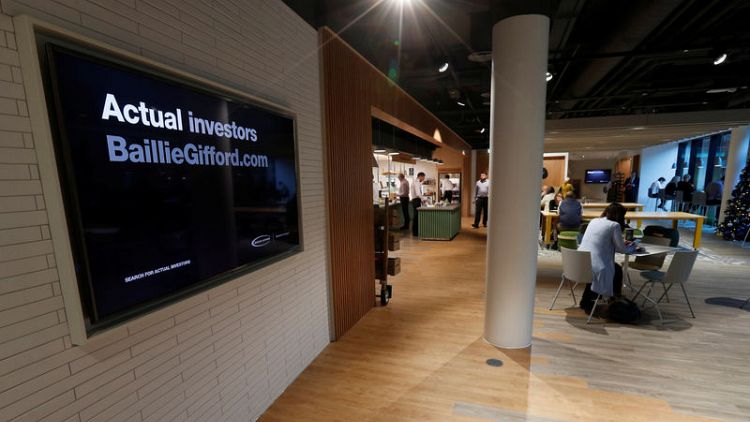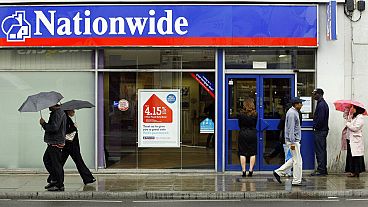By Elisabeth O'Leary
EDINBURGH (Reuters) - With no public profit or budget goals and quietly run by its 44 owner-partners, Edinburgh-based Baillie Gifford has ammassed 200 billion pounds in funds under management.
And Britain's 8th biggest fund manager has grown its assets under management, which rose by 24 percent last year versus 11 percent for the UK sector, by 9 percent from December 2017 to September this year, Baillie Gifford partner Stuart Dunbar said.
"We don't have infinite investment capacity. We don't have any business growth targets. It is not even our ambition to necessarily get bigger," Dunbar told Reuters.
"We're sensible and Scottish," he said after Baillie Gifford launched its first big advertising campaign in the City of London, costing the normally shy firm "a few million pounds" as it adapts to a new environment.
As successive British governments hand more say in retirement planning to individuals, its core client base is changing and advertising ensures it reaches new audiences.
Asset managers such as Baillie Gifford, which has faced criticism for a lack of transparency, are coming up against heavier regulation, more demanding investors and an increasingly unpredictable global economic horizon driven by geopolitics.
Against this backdrop, Baillie Gifford's recent success contrasts with local rival Standard Life Aberdeen <ASI.L>, the product of a merger last year, whose assets shrank by 3 percent in the first half of 2018.
Founded in 1908, Baillie Gifford is helped by its global reach, with its Asian and U.S. funds up by 100 and 33 percent respectively over the last decade.
Assets under management have grown by 71 percent since 2014 versus the sector's 40 percent growth, public data and figures from the company seen by Reuters shows. Most of that is outperformance rather than bringing in new money, Dunbar said.
Recent successes include Britain's best-performing fund in 2018, Baillie Gifford American, one of four it has in Britain's top 20 of fund performers, Lipper data shows.
"Obviously we are a business, and we need to be a successful business. But if you try and target profitability, in and of itself, you will just mess your business up," he added.
EXPANDING HORIZONS
Baillie Gifford's confidence is such that it is opening a new Edinburgh office on a 15-year lease for some of its around 1,000 staff, now growing at a 7 percent annual clip, ahead of its sector, data from the Investment Association shows.
Scotland's capital, with a long history of financial services expertise, also has a strong base for technology and among its academic sponsorship programmes Baillie Gifford has backed an Edinburgh University investigation into the impact of artificial intelligence.
"It's about understanding tech development and getting people who are smarter than us to talk about developments," Dunbar said. "It's not about reading a brokers' note quicker than anyone else."
The firm itself is tech-heavy with around a quarter of its staff employed in IT, designing and building bespoke systems for investment analysis.
Much of Baillie Gifford's recent success can be attributed to choosing a similarly-minded partner in the United States. Vanguard, which also has no outside shareholders. It has stuck with its tech-heavy bets such as Amazon and Google for years.
"We are trying to focus on the fundamentals of deploying capital to produce companies that provide goods and services that people want to buy. Doing that job properly actually has value for society," Dunbar said.
The Scottish firm's UK-domiciled American Fund, an e-commerce and biotech-heavy investment selection backing Amazon, Tesla and healthcare tech firm Abiomed, has gained around one third in value for three years before fees in sterling terms.
It has also started to build into client portfolios stocks which would ordinarily be classed as venture capital, such as unlisted Air BnB, without charging extra fees.
"On the really good investments, you can make 30 or 40 times your money. The ones that don't work you lose your money once," Dunbar said of the risks involved in this strategy.
For many in the financial services industry in Britain, the biggest risk on the horizon is the impact of Brexit. Dunbar said Baillie Gifford has developed further its contingency plan in addition to opening a Dublin office from which to manage its EU-domiciled funds in case arrangements change.
"We can route clients through different operating companies in order to continue to manage the money from Edinburgh."
(Reporting by Elisabeth O'Leary; Editing by Alexander Smith)



